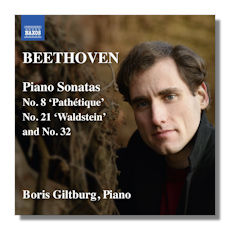
The Internet's Premier Classical Music Source
Related Links
- Beethoven Reviews
- Latest Reviews
- More Reviews
-
By Composer
-
Collections
DVD & Blu-ray
Books
Concert Reviews
Articles/Interviews
Software
Audio
Search Amazon
Recommended Links
Site News
 CD Review
CD Review
Ludwig van Beethoven

Piano Sonatas
- Sonata for Piano #8 in C minor, Op. 13
- Sonata for Piano #21 in C Major "Waldstein", Op. 53
- Sonata for Piano #32 in C minor, Op. 111
Boris Giltburg, piano
Naxos 8.573400 69:10
This is Boris Giltburg's second recording for Naxos, the first being a disc of Schumann works, which I reviewed here earlier this year (Naxos 8.573399) and found mostly quite good. I issued an even more positive notice for his recording of Prokofiev's War Sonatas in 2012 (Orchid Classics ORC100023). In recent years Giltburg has been a major international presence in the concert world, bolstered by his first prize victory at the 2013 Queen Elizabeth Competition. He is obviously a hugely talented pianist.
He begins the Pathetique Sonata with an appropriately dark and mysterious introduction, his subtly crafted dynamics featuring very hushed pianos and potent but not overwhelming fortes. The main Allegro section is judiciously paced and with a sense of urgency, again divulging a range of well judged dynamics. Here and in the finale Giltburg plays with a crisp legato touch, quite fitting for Beethoven's lean Classical writing. The middle movement is played with a more flowing legato style, and rightly so as the music here is more lyrical, even Romantic. The Rondo finale is energetic yet elegant in Giltburg's hands, but he manages to catch the fiery and darker elements of the music too. Overall, this is an excellent Pathetique.
The Waldstein features a slightly understated first movement, at least compared with performances by Horowitz and many others. Giltburg offers a fairly straightforward and elegant account that features plenty of energy and drive, and a deft sense for drama. He is closer in style to Brendel than to old-school pianists like Horowitz. Giltburg's finale begins with a very measured, somewhat restrained character and continues with a lean, Classical approach. He seems to play down the epic elements here and focus more on subtlety and elegance. It's a good performance if you favor his more reserved manner.
Beethoven's last piano sonata begins quite dramatically, the opening chords sounding ominous and dark, and the introduction on the whole conveying a strong sense of mystery and gloom. The main Allegro section is lively and spirited, with Giltburg giving the music more weight and muscle than in the previous works. Still, he plays with a crispness of tone and looks back toward the Classical era rather than forward to the Romantic. The long theme-and-variations second (and final) movement is mostly a success. Giltburg conveys an ethereal mood in his subtle phrasing in the opening. Perhaps only the third, sort of ragtime-like variation sounds a little stiff in its brisk tempo here. The remainder of the movement has an elegant and misty quality that is quite appropriate, though I think his trills sound brittle in places. As the ending approaches Giltburg gives the main theme more a sense of triumph than of radiance or lightness, but still manages to make it all sound rather celestial.
In the end, some listeners may find Giltburg's playing a bit controversial, especially in the Waldstein, but he is always tasteful and technically assured and, in his own somewhat understated manner, brilliant and insightful. The sound reproduction is very vivid and the pianist's album notes are intelligent and informative. There are many great interpreters of Beethoven's sonatas, including Brendel, Schnabel, Ashkenazy, Barenboim and Buchbinder, and now the young Boris Giltburg has spoken with authority and carved out a significant niche of his own.
Copyright © 2015, Robert Cummings





















